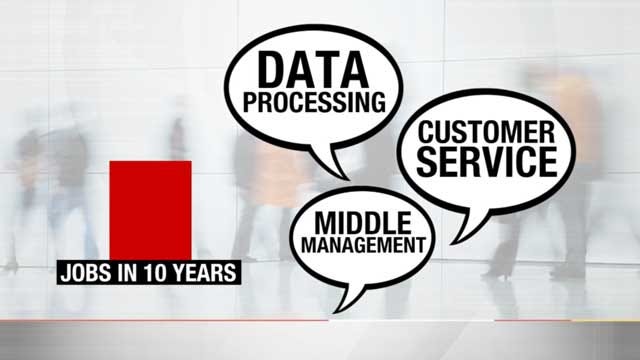Fast Forward 10 Years - Jobs That May Not Exist in 2025
The workforce is changing fast. A report shows in just 10 years, 50 percent of the occupations we have today will no longer exist; a staggering reality many students face as they try to map out their futures.Tuesday, May 5th 2015, 10:30 pm
The workforce is changing fast. A report shows in just 10 years, 50 percent of the occupations we have today will no longer exist; a staggering reality many students face as they try to map out their futures.
The report titled 'Fast Forward 2030: The Future of Work and the Workplace' was generated by realty consulting firm CBRE and China-based property developer Genesis. The study interviewed 220 experts, business leaders and young people from Asia, Europe and North America.
The report predicts workspaces with rows of desks will become completely redundant, not because they are not fit for purpose, but simply because that purpose no longer exists, primarily jobs in data processing, customer service and middle management. And those are reasons some college students are staying flexible in their career options.
"I can't predict with certainty what jobs will be here in 10 years. I don't think anyone can," said Carsen Moon, a senior economics major at Oklahoma City University. "Recently I've applied for research positions in the government and I've applied for business analyst jobs and I've also looked at non-profit jobs."
Elizabeth Enck with Career Services at the University of Central Oklahoma says she is already seeing the shift in the job market, especially in the manufacturing and print industries.
"I think you're finding fewer of those just because they can be replaced or done quicker with different software programs," she said. "I think it's just a natural transition that things do change over time."
The report forecast new jobs in the future could be based more on a person's creative, social and emotional intelligence. Knowing how to use artificial intelligence is also a plus. Enck suggests students gain transferable skills they can use in any job, technology being a big one, but also critical thinking, communication and teamwork skills.
"All the jobs I've looked at have required some knowledge of software that's not typically taught in conventional degree programs," Moon said.
That's why he's has spent the past two years working as a research assistant on campus. What about those professional already in the workforce, like real estate professional Denise Schroder? The study found even further in the future -- which the majority of real estate transactions may be made online.
"You need a real estate professional that can truly advocate for you through the entire process," Schroder said. "You can't replicate that through an online experience."
Aggregators like Trulia and Zillow already exist -- giving buyers a lot of information. But right now even though the majority of buyers start online, 88 percent end up using an agent, something Denise doesn't believe will change with the times.
"We wear a lot of hats. We're marketing experts. We're data analysts. We do so many different things besides negotiate," Schroder said.
And as for Moon, "I don't really know where I'll be in a year or even three months and so I feel like my economics degree and my business degree allow me to be flexible especially when I'm facing this uncertainty in my future."
Some career counselors feel like some professions like teachers or healthcare workers are safe from being completely replaced by technology.
More Like This
May 5th, 2015
November 13th, 2024
October 28th, 2024
October 17th, 2024
Top Headlines
November 20th, 2024
November 20th, 2024
November 20th, 2024
November 20th, 2024









